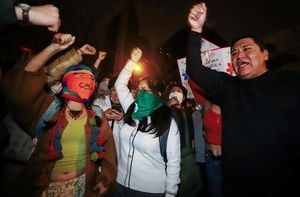On the eve of the 24th anniversary of the September 11 attacks, a fierce political battle has erupted in Washington over the fate of the World Trade Center Health Program (WTCHP), the federal initiative designed to care for the first responders and survivors whose lives were forever altered by the events of that day. The controversy, which centers on delays and staff reductions within the program, has drawn bipartisan attention and fresh scrutiny to the current leadership at the Department of Health and Human Services (HHS), led by Secretary Robert F. Kennedy Jr.
On September 10, 2025, Senator Andy Kim of New Jersey led a coalition of Democratic senators—many representing states directly affected by the 9/11 attacks—in sending a pointed letter to Secretary Kennedy. Their message was clear: the recent disruptions in the WTCHP are putting the very people it was created to protect at risk. According to InsiderNJ, the senators wrote, “Dismantling the work of WTCHP puts heroic 9/11 responders’ lives at risk.” The letter was also signed by Democratic Leader Charles E. Schumer (New York), Senators Kirsten Gillibrand (New York), Cory Booker (New Jersey), Richard Blumenthal (Connecticut), and Tim Kaine (Virginia).
The senators’ concerns are far from abstract. The WTCHP, administered by the National Institute for Occupational Safety and Health (NIOSH) within the Centers for Disease Control and Prevention (CDC), has recently halted the process mandated under the Zadroga statute to consider whether new conditions should be added to the list of illnesses covered by the program. This pause, they argue, directly undermines the ability of first responders and survivors—many of whom are battling cancers, chronic coughs, and other debilitating illnesses tied to their exposure at Ground Zero, Shanksville, and the Pentagon—to receive the care they need and are legally entitled to.
“This delay in recognizing new health conditions tied to exposures received at Ground Zero, at Shanksville, and at the Pentagon harms the ability of the first responders who heroically responded to 9/11 to get the health care they need and are entitled to under the WTCHP,” the senators wrote, as reported by InsiderNJ and NBC News.
The WTCHP’s troubles go beyond bureaucratic inertia. In recent months, the program has been rocked by funding shortages and a wave of staffing cuts. Perhaps most notably, Dr. John Howard, the long-serving NIOSH Director and WTCHP Administrator, was terminated in what the senators described as an “indiscriminate” firing. The loss of experienced staff, they argue, has only exacerbated delays and created monthslong wait times for survivors seeking appointments—delays that can mean the difference between an early, treatable diagnosis and a life-threatening progression of disease.
Earlier in 2025, a bipartisan outcry forced the Trump administration to rehire federal workers who help run the critical health program after they were let go during a round of budget cuts referred to as the DOGE cuts. Yet, despite assurances that key staff would be reinstated, the senators say little progress has been made. “After several Members of Congress pressed for the reinstatement of WTCHP staff necessary for the program’s functioning, including Dr. Howard, we understood the issue to be resolved, based on your personal commitment to us. Thus, we are extremely concerned by new reports that there have been no further action on petitions to the program to add health conditions under the WTCHP,” the senators wrote in their letter.
The stakes could hardly be higher. The WTCHP serves as a lifeline for thousands of 9/11 first responders and survivors, providing medical monitoring, treatment, and support for a host of physical and mental health conditions linked to toxic exposures in the aftermath of the attacks. As NBC News notes, the program’s mandate includes not only treating currently recognized illnesses but also evaluating whether new conditions should be covered as evidence evolves. The current delays, the senators warn, threaten to undermine the very foundation of that mission.
“The program has experienced funding shortages and staffing cuts, resulting in monthslong wait times for some survivors seeking appointments, delaying critical diagnoses and treatment,” NBC News reported on September 11, 2025. For many, the delays are not just an inconvenience—they are a matter of life and death.
In their letter, the senators demanded a congressional briefing by October 10, 2025, seeking answers on the failure to recognize new health conditions and the program’s fulfillment of its core mission. They want to know how the WTCHP is enrolling newly eligible members, conducting surveillance and research to support the addition of new health conditions, and communicating with the public about these efforts. The request reflects a broader anxiety about whether the program, already strained by years of political wrangling and budgetary uncertainty, can meet the needs of those it was created to serve.
Meanwhile, the controversy has become a flashpoint in a broader debate about the responsibilities of government in caring for those who have sacrificed in service to the nation. For some, the delays and disruptions are symptomatic of deeper dysfunction at HHS under Secretary Kennedy’s leadership. Others see the issue as emblematic of the ongoing struggle to keep 9/11’s legacy at the forefront of national priorities, even as the attacks fade further into history.
While the senators leading the charge are all Democrats, the WTCHP’s troubles have not gone unnoticed across the aisle. Earlier this year, bipartisan pressure was instrumental in reversing staff firings, underscoring the wide-ranging support for the program’s mission. Yet, as the latest letter makes clear, frustration is mounting over what many see as a lack of follow-through and a growing disconnect between Washington’s promises and the reality on the ground for 9/11 survivors and responders.
Adding to the sense of urgency is the timing of the senators’ intervention. With the nation marking yet another anniversary of the attacks, the plight of those still suffering from 9/11-related illnesses has taken on renewed resonance. As NBC News points out, Democrats’ demand for answers from Secretary Kennedy came on September 11 itself—a date that carries immense symbolic weight for Americans of all political stripes.
For the thousands of first responders and survivors who depend on the WTCHP, the outcome of this latest political showdown will have real and immediate consequences. The senators’ letter may be the latest volley in a long-running battle, but for those living with the scars of 9/11, the stakes are anything but abstract. Their fight for recognition, care, and dignity continues—two decades on, and counting.
As the October deadline for a congressional briefing approaches, all eyes will be on Secretary Kennedy and the future of the WTCHP. For now, the fate of a program that has come to symbolize the nation’s commitment to its heroes hangs in the balance, a stark reminder that the legacy of 9/11 is still being written.



